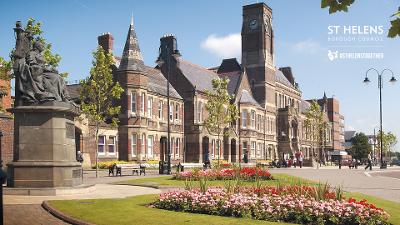Council leader welcomes Carr Mill station funding plans
St Helens Borough is set to benefit from a historic £1.6 billion investment to help deliver the next stage of the Liverpool City Region transport revolution - backing major rail upgrades including the development of Carr Mill Station here in St Helens.

Article date: 4 June 2025
The funding, confirmed by the Chancellor ahead of this year's Spending Review, represents the single largest investment in the region's transport infrastructure to date. Projects funded will help drive economic growth, link communities and create opportunity across the whole region.
Secured through the City Region Sustainable Transport Settlement (CRSTS), this funding will accelerate Mayor Steve Rotheram's plans for a London-style public transport system - clean, integrated and accessible to all - while laying the groundwork for thousands of new homes, jobs and training opportunities.
At the heart of the plans is the largest-ever investment in local rail station infrastructure. Work will now progress on three new stations including Carr Mill, with further developments in Wirral and Halton.
This is part of a broader programme to transform the region's bus network, supporting the introduction of a zero-emission fleet, new depot infrastructure, and the rollout of franchising - returning buses to public control for the first time in nearly 40 years.
St Helens Borough Council Leader Councillor Anthony Burns, said:"This is brilliant news for our borough with confirmation of the investment into Carr Mill Station among the key announcements from the Chancellor Rachel Reeves today. We have long been advocating for the development of a new station at Carr Mill to provide greater connectivity for our residents in an area that would be boosted by this development and revitalise a brownfield site.
"This, along with the additional investment in the borough from the Liverpool City Region such as the £32 million new transport interchange in St Helens town centre, will support our efforts to improve public transport that is used by our residents every day and support our efforts to make our transport cleaner too."
Steve Rotheram, Mayor of the Liverpool City Region, said: "This is a really big win for our area and for the 1.6m people who call it home.
"It means new train stations where they're needed most, better buses that actually turn up, and a new rapid transit system to help people get where they need to be - whether that's for work, education, socialising or care.
"For too long, too many of our communities have had to put up with second-rate services. This is our chance to put that right.
"With buses coming back under public control for the first time in a generation, this funding gives us the tools to shape a transport system that puts people first. And while the headline projects are important, the real value lies in the flexibility it gives us to keep investing in the infrastructure our communities need now and into the future."
Transport Secretary, Rt Hon Heidi Alexander MP, said: "Today marks a watershed moment on our journey to improving transport across the North and Midlands - opening up access to jobs, growing the economy and driving up quality of life as we deliver our Plan for Change.
"For too long, people in the North and Midlands have been locked out of the investment they deserve. With £15.6bn of Government investment, we're giving local leaders the means to drive cities, towns and communities forward, investing in Britain's renewal so you and your family are better off."
Beyond the three flagship projects, the funding will also back a number of schemes aimed at revitalising and reconnecting towns across the city region as part of a broader strategy to encourage a shift from car use to public transport and achieve the region's Net Zero 2035 target.
Recent investments in the Liverpool City Region transport network include the purchase of 100 zero-emission double-decker electric buses; a £32 million transport interchange for St Helens town centre; £26 million for the first new Mersey Ferry in over 60 years; £150 million for new walking and cycling infrastructure; £15 million for a revamp of key city region gateway Runcorn station and £100 million for the new Liverpool Baltic rail station.




